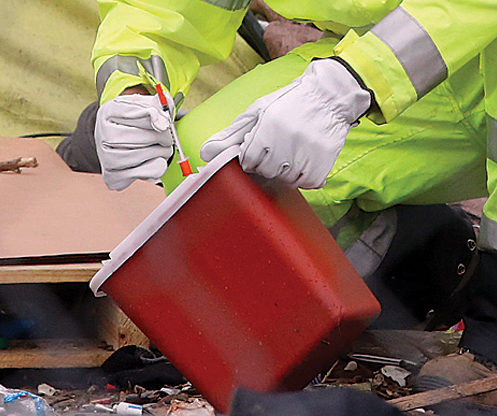A Sacramento Superior Court judge on Monday revoked the Harm Reduction Coalition’s authority to operate its syringe distribution program in Santa Cruz County.
Launched in 2018, the nonprofit Harm Reduction Coalition (HRC)—and “harm reduction” programs in general—operate on the philosophy that providing clean supplies such as syringes to drug users will prevent the sharing of dirty needles, and thereby stop diseases such as HIV and Hepatitis C.
The group, which operates with volunteers, also claims to collect used syringes from public places throughout the county and installs containers where people can deposit syringes in several places, emptying them when full.
Organizers say theirs is meant to work in conjunction with the Santa Cruz County’s Syringe services program.
But opponents say the program does more harm than good.
A lawsuit filed in 2020 by the Grant Park Neighbors Association states that HRC’s program operates “in direct conflict” with the county’s SSP because it allows untrained volunteers to perform its services.
HRC founder Denise Elerick says the organization has filed a new application with the State Department of Public Health’s Office of AIDS to distribute syringes, one she says will check all the appropriate boxes with state regulators.
“This will not stop our operations,” she says. “This is just a temporary setback.”
In the meantime, Elerick says HRC will continue its other work, which includes distributing wound care supplies and educational materials, Fentanyl test strips in addition to Naloxone, the overdose reversal drug also known as Narcan. They also provide supplies necessary to prevent infections, as well as places to dispose of used syringes.
With the new application, state officials will more closely “weigh the public health benefits with the concerns of law enforcement,” she says.
“This is about overdose prevention, HIV prevention, hepatitis-C prevention and sexually transmitted infection prevention,” she says. “That’s what we do. And they will weigh the benefits of that work with the concerns of law enforcement and then they make their decision after that.”
Elerick did not comment on the timeline of the application.
The judge’s decision, effective immediately, applies to similar programs statewide, said attorney David Terrazas, who represents the Grant Park Neighbors Association. That neighborhood group has battled HRC from its inception, saying they have seen an increase in used needles in Pogonip Open Space near Harvey West Neighborhood, one of the places where HRC operates.
The judgment comes after a unanimous decision on Aug. 14 by the Third Appellate District Court, which said that the Department of Public Health (DPH) broke the law by not consulting with local law enforcement agencies before approving HRC’s 2020 application.
Instead, the DPH referred to the former Santa Cruz City Police Chief as an “imbecile,” and stated there was “no need to respond” to his public safety concerns and local impacts.
The decision also has statewide implications, since it will force other jurisdictions considering applications from organizations like HRC to consult with law enforcement agencies and to hold extended public comment periods, Terrazas says.
Terrazas points to HRC’s own state-mandated reporting, which shows that the organization distributed roughly 796,060 syringes in 2020-21, but only 432,705 were collected, leaving more than 350,000 discarded needles unaccounted for.
“This decision upholds the rights of local residents and local law enforcement leaders to increase public safety associated with future projects like this, and also holds administrative agencies accountable for their decisions and the impacts they have on local communities,” he says. “Locally managed, well-run needle exchange programs are critically important throughout California. The state’s illegal authorization of this all-volunteer program undermined the public safety of Santa Cruz County residents and diminished the efficacy of the existing county program that includes wraparound services including substance abuse treatment.”












